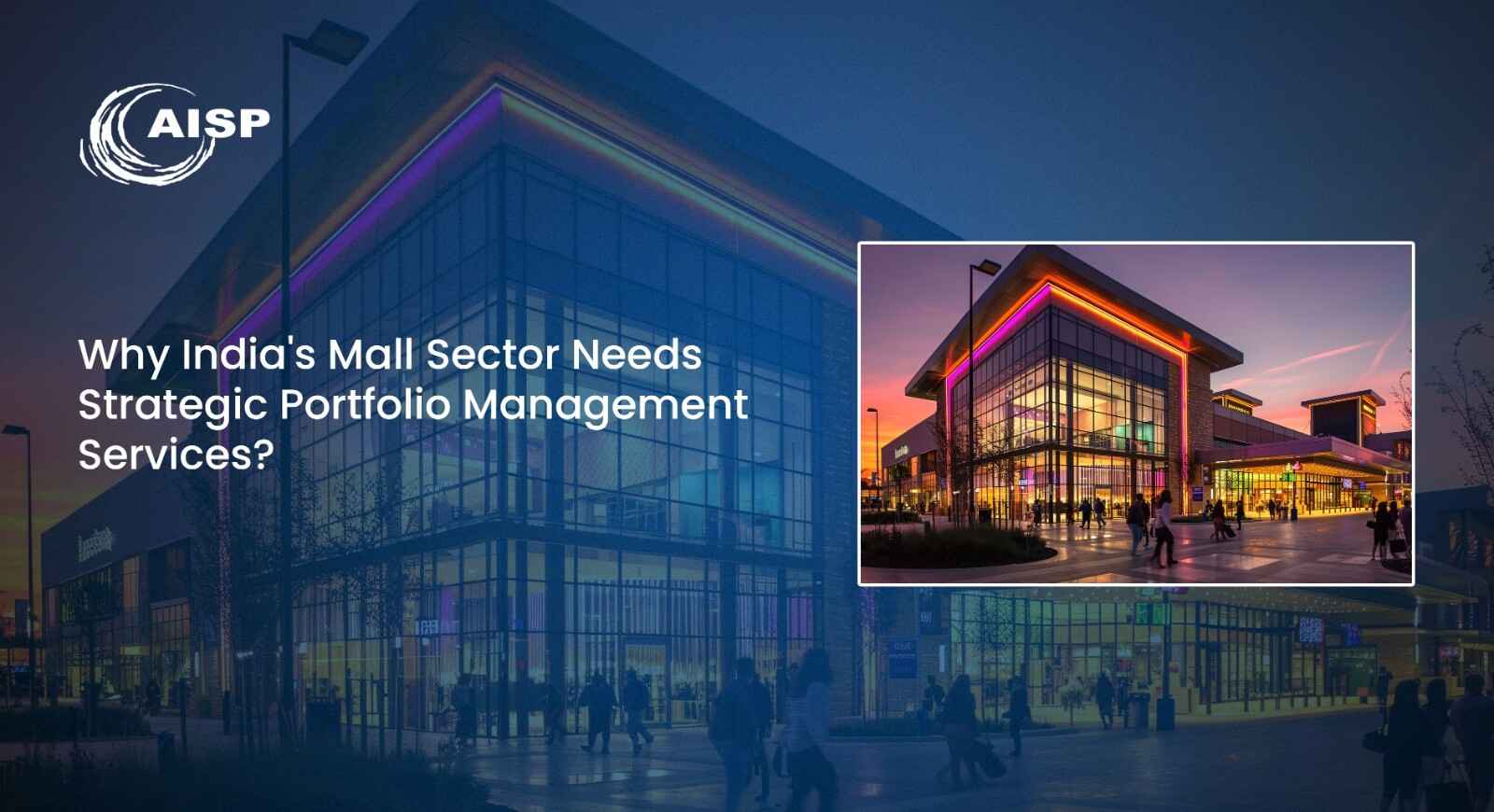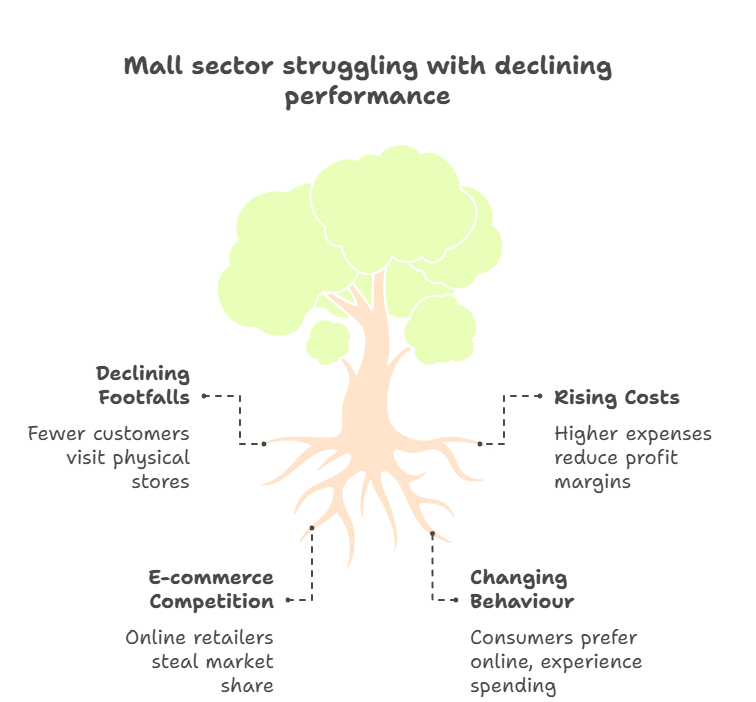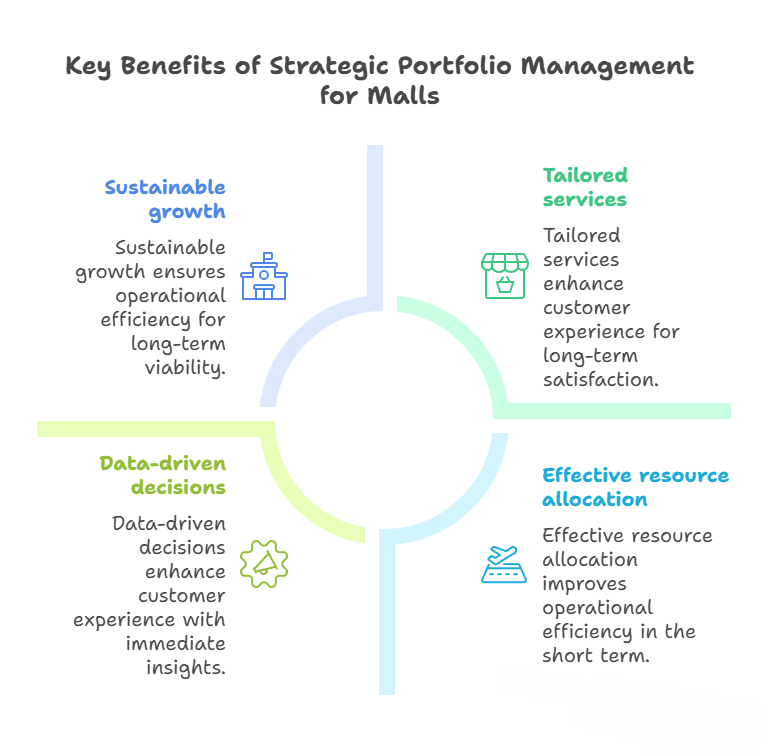
Why India’s Mall Sector Needs Strategic Portfolio Management Services?
India’s retail landscape is evolving rapidly, and shopping malls are at the centre of this transformation. With rising competition from e-commerce, shifting consumer behaviour, and the need for better customer experiences, malls can no longer rely on traditional management methods. This is where Strategic Portfolio Management for Malls becomes essential.
By aligning operations, tenant mix, financial planning, and customer engagement under a structured portfolio strategy, malls can stay competitive, attract consistent footfalls, and achieve long-term growth. Instead of just managing spaces, strategic portfolio management helps malls create value, improve profitability, and build resilience in a fast-changing retail environment.
What is Strategic Portfolio Management?
Strategic Portfolio Management (SPM) is the practice of planning, managing, and aligning a group of projects, investments, or assets with an organisation’s long-term goals. In the context of shopping malls, it means managing the entire mall portfolio—tenants, operations, facilities, and investments, in a way that maximises value and ensures sustainable growth.
Instead of looking at each element separately, strategic portfolio management takes a holistic approach. It balances costs, revenue, customer experience, and future opportunities to make sure every decision supports the mall’s overall vision. For malls, this could mean choosing the right tenant mix, planning upgrades, improving operational efficiency, and ensuring financial stability.
Challenges Faced by the Mall Sector in India

1. Declining Footfalls
Many malls across India are witnessing fewer visitors compared to the past. Factors such as online shopping, changing lifestyles, and traffic congestion often discourage people from visiting malls regularly. This decline directly affects sales and overall profitability.
2. Rising Operational Costs
Running a mall involves high costs in areas like maintenance, utilities, staffing, and security. With energy prices and overhead expenses going up, operational costs are becoming a big challenge for mall owners and managers.
3. Competition from E-commerce
E-commerce platforms are providing customers with the convenience of shopping from home, attractive discounts, and faster delivery. This growing trend has reduced physical store visits, forcing malls to rethink how they can attract shoppers.
4. Changing Consumer Behaviour
Today’s consumers are not only looking for shopping options but also for unique experiences such as dining, entertainment, and events. Malls that fail to adapt to these changing expectations risk losing relevance in the market.
Also Read:- 5 Reasons Developers Trust AISP for End-to-End Project Management
Why Strategic Portfolio Management is Essential for Malls
Optimising Asset Performance
Strategic Portfolio Management for Malls ensures that every part of the property is used effectively. By tracking performance, identifying underutilised areas, and improving facilities, mall owners can increase returns while delivering a better experience for visitors.
Enhancing Tenant Mix and Leasing Strategy
A successful mall depends on having the right balance of retail, dining, and entertainment options. With Strategic Portfolio Management, malls can refine their tenant mix, attract strong brands, and design leasing strategies that boost footfall and customer satisfaction.
Driving Revenue Growth
Through data-driven insights and proactive management, Strategic Portfolio Management for Malls helps identify new revenue streams—whether from events, advertising, or premium services, ensuring consistent financial growth.
Risk Management and Cost Efficiency
Malls face risks such as rising costs, tenant defaults, or market shifts. Strategic Portfolio Management enables mall owners to plan ahead, reduce operational expenses, and manage risks efficiently, making operations more sustainable.
Key Benefits of Strategic Portfolio Management for Malls

Better Financial Planning
Strategic Portfolio Management for Malls allows owners to plan their finances more effectively. By monitoring income, expenses, and investment opportunities, it ensures better budgeting and long-term financial stability.
Improved Customer Experience
A mall’s success depends on how well it serves its visitors. With Strategic Portfolio Management, mall operators can improve layouts, introduce new facilities, and create engaging experiences that attract and retain customers.
Sustainable Growth
Portfolio Management helps malls grow steadily by balancing short-term profits with long-term goals. It supports expansion, tenant retention, and efficient operations while keeping the business sustainable in a competitive market.
Data-Driven Decision Making
With access to reliable data and performance insights, mall owners can make informed decisions. Management for Malls ensures every strategy is backed by real data, reducing risks and improving outcomes.
Final Thought
The mall sector in India is at a turning point. To stay competitive and profitable, malls need more than just good design and attractive stores, they need a clear, data-driven strategy. Management for Malls ensures that every decision, from tenant mix to cost planning, supports long-term growth and customer satisfaction.
At AISP Project Management Consulting, we specialise in providing customised portfolio management solutions that help malls optimise performance, reduce risks, and achieve sustainable success. With our expertise, mall owners can focus on creating vibrant destinations that deliver value to both tenants and visitors.



